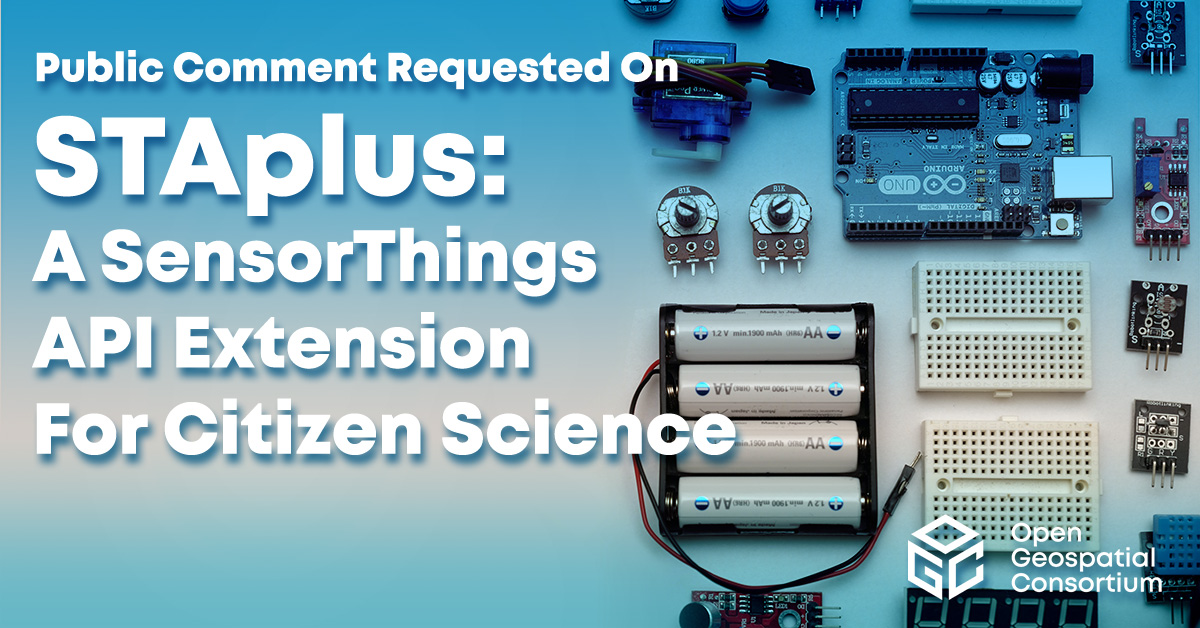Request Closed: February 20, 2023 12:00 am — March 23, 2023 12:00 am (AoE)
The Open Geospatial Consortium (OGC) is seeking public comment on STAplus 1.0. STAplus is an extension to the OGC SensorThings API Part 1: Sensing Version 1.1 (STA) Standard data model that is based on requirements from the Citizen Science community. Comments are due by March 23, 2023.
STAplus (SensorThings API extension PLUS) defines a SensorThings data model extension that improves FAIR data principles when exchanging sensor data by including licensing and ownership information.
The dominant use for the OGC SensorThings API (STA) data model (and API) can be thought of as “a single authority provides sensor readings to consumers.” However, in Citizen Science there are many contributors (citizens) whose observations together form the “big picture.”
The STAplus extension is designed to support a model in which observations are owned by (different) users that may express a license for re-use.
In addition to the ownership and license abilities, the extension enables users to express explicit relations between observations as well as create group(s) of observations that containerize observations that belong together. Relations can be created among any individual observations or observations of a group to support performant Linked Data extraction and semantic queries, for example expressed in SPARQL.
The STAplus extension is an important contribution towards the realization of the FAIR principles as STAplus strengthens the “I” (Interoperability) through a common data model and API as well as the “R” (Re-usability) by allowing standards-based queries that consider any licensing conditions relevant for the re-use of other users’ observations.
The STAplus Data Model and Business Logic will enrich existing deployments as the extension can be seamlessly added and thereby offer new capabilities to create and manage the “big picture” with multi-user capabilities.
The key work for crafting this OGC Standard was undertaken in the Co-designed Citizen Observatories Services for the EOS-Cloud (Cos4Cloud) project, which received funding from the European Union’s Horizon 2020 research and innovation program under grant agreement number 863463. Testing of this extension was done with data from the Framework biodiversity project, which received funding from the European Union’s Horizon 2020 research and innovation program under grant agreement number 862731.
OGC Members interested in staying up to date on the progress of this standard, or contributing to its development, are encouraged to join the SensorThings SWG via the OGC Portal. OGC also runs a public Citizen Science Domain Working Group. OGC Members can join via this page on the OGC Portal, while non-members can contact OGC to get involved.
The candidate OGC SensorThings API 1.1 Extension: STAplus 1.0 Standard is available for review and comment on the OGC Portal (22-022) (.PDF). Comments are due by March 23, 2023 and should be submitted via the method below.
To Comment:
Comments can be submitted to a dedicated email reflector for a thirty day period ending on the “Close request date” listed above, Comments received will be consolidated and reviewed by OGC members for incorporation into the document. Please submit your comments using the following link: Click here to submit comments.
Please refer to the following template for the message body: Comments Template.
Subscribe to Comments:
You may wish to be added to the distribution list to receive comments as they are submitted. Subscribe to Distribution List. Subscribing to the list will also allow you to view comments already received, which can be found in the List Archives.
About OGC
The Open Geospatial Consortium (OGC) is a collective problem-solving community of more than 550 experts representing industry, government, research and academia, collaborating to make geospatial (location) information and services FAIR – Findable, Accessible, Interoperable, and Reusable.
The global OGC Community engages in a mix of activities related to location-based technologies: developing consensus-based open standards and best-practices; collaborating on problem solving in agile innovation initiatives; participating in member meetings, events, and workshops; and more.
OGC’s unique standards development process moves at the pace of innovation, with constant input from technology forecasting, practical prototyping, real-world testing, and community engagement.
OGC bridges disparate sectors, domains, and technology trends, and encourages the cross-pollination of ideas between different communities of practice to improve decision-making at all levels. OGC is committed to creating an inclusive and sustainable future.
Visit ogc.org for more info on our work.
